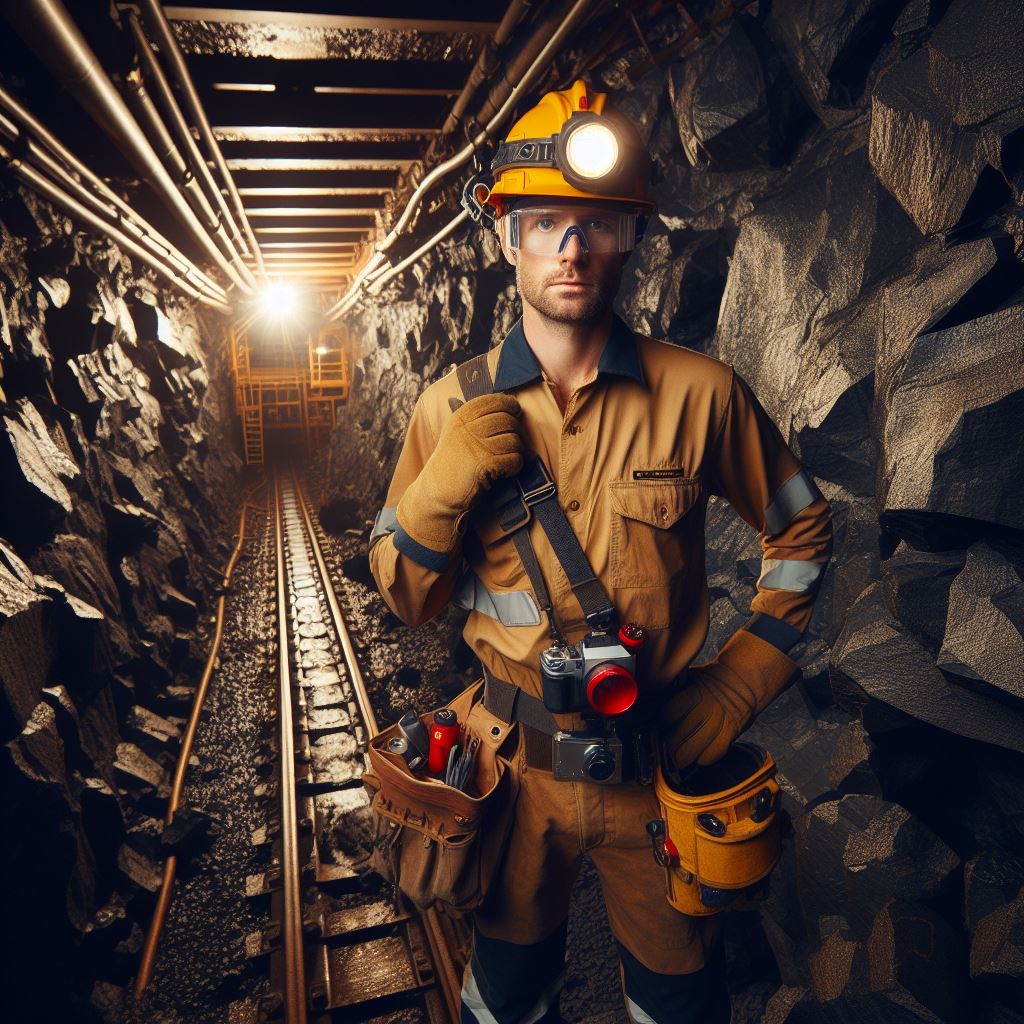Introduction
Australia’s mining industry is a powerhouse, driving economic growth and development with its vast mineral wealth.
At the heart of this industry lie mining engineers, whose expertise and ingenuity are pivotal in orchestrating the extraction of valuable minerals that fuel the nation’s prosperity.
Mining engineers are instrumental in every stage of the mining process, from initial exploration to final extraction.
They play a crucial role in surveying potential sites, analyzing geological data, and designing efficient mining operations that maximize resource recovery while minimizing environmental impact.
Moreover, mining engineers are at the forefront of innovation, constantly seeking new technologies and techniques to improve efficiency and sustainability in mining operations.
They are pioneers in automation, renewable energy integration, and environmentally friendly mining practices, driving the industry towards a more sustainable future.
Beyond their technical responsibilities, mining engineers also navigate complex regulatory frameworks, ensure compliance with safety and environmental standards, and engage with local communities to foster positive relationships and address social concerns.
In essence, mining engineers are the backbone of Australia’s mining sector, combining technical expertise with a commitment to sustainability and social responsibility.
As the industry continues to evolve, their role will only become more critical in shaping a prosperous and sustainable future for Australia’s mining industry.
Education requirements for becoming a mining engineer in Australia
Undergraduate degree programs
- Bachelor of Engineering (Mining): This degree program focuses on providing students with a strong foundation in engineering principles and prepares them for a career in the mining industry.
- Bachelor of Science (Mining Engineering): This program combines scientific and engineering principles to equip students with the necessary skills for a successful career as a mining engineer.
When it comes to pursuing a career in mining engineering in Australia, there are specific educational requirements that need to be met.
Mining engineers play a crucial role in the extraction and processing of minerals, making their expertise vital to the mining industry.
To become a mining engineer in Australia, individuals must fulfill certain educational pathways.
Undergraduate degree programs
The first step towards becoming a mining engineer in Australia is to complete an undergraduate degree program.
Two common undergraduate degree options in mining engineering are the Bachelor of Engineering (Mining) and the Bachelor of Science (Mining Engineering).
Bachelor of Engineering (Mining)
The Bachelor of Engineering (Mining) program is designed to provide students with a comprehensive understanding of engineering principles as they apply to the mining industry.
Through this program, students learn about the technical and practical aspects of mining, such as mine planning, mine development, and mineral processing.
By studying subjects like geomechanics, mine ventilation, and mineral economics, students gain a solid foundation in mining engineering.
The program also includes practical training and mining site visits to familiarize students with real-world mining operations.
Bachelor of Science (Mining Engineering)
The Bachelor of Science (Mining Engineering) program takes a slightly different approach by combining scientific knowledge with engineering principles.
This program aims to equip students with a well-rounded skill set that encompasses both the theoretical and practical aspects of mining engineering.
Students enrolled in this program study core subjects such as geology, chemistry, and mathematics, in addition to specialized mining engineering courses.
They learn about mining methods, mineral exploration, and mine safety, among other topics.
Practical experience is also emphasized through laboratory work and field trips.
Both undergraduate degree programs typically span four years and require students to complete a set number of credit points.
Additionally, students may have the opportunity to undertake internships or industry placements, allowing them to gain valuable hands-on experience in the mining sector.
Upon successful completion of an undergraduate mining engineering degree program, graduates are equipped with the necessary knowledge and skills to enter the mining industry as engineers.
Depending on their interests and career goals, they may choose to pursue further studies or seek employment in various mining-related roles.
Generally, obtaining an undergraduate degree in mining engineering is a fundamental requirement for aspiring mining engineers in Australia.
Whether through the Bachelor of Engineering (Mining) or the Bachelor of Science (Mining Engineering) program, these educational pathways provide students with the essential knowledge and practical skills needed to contribute to the mining industry.
Read: Future of Agri-Environmental Management in AU
Accreditation and licensing for mining engineers
Overview of Engineers Australia
Engineers Australia is the national body representing the engineering profession and maintaining professional standards.
In order to become a licensed mining engineer in Australia, individuals must meet the accreditation requirements set by Engineers Australia.
Engineers Australia offers different membership levels, including student, graduate, and chartered memberships.
As a student member, aspiring mining engineers can gain access to valuable resources, networking opportunities, and mentorship programs.
Graduate memberships are available for individuals who have completed their engineering degree and are beginning their professional career.
To become a chartered member, mining engineers need to demonstrate their skills and experience through a rigorous assessment process.
Chartered members are recognized for their advanced knowledge and competency in their respective fields.
Professional Engineer (Mining) designation
Within Engineers Australia, the Professional Engineer (Mining) designation is specifically designed for mining engineers.
Your Personalized Career Strategy
Unlock your potential with tailored career consulting. Get clear, actionable steps designed for your success. Start now!
Get StartedBy obtaining this designation, mining engineers gain national recognition for their expertise in the mining industry.
The Professional Engineer (Mining) designation signifies that an engineer has achieved a high level of technical knowledge and practical skills.
It enhances the professional standing of mining engineers and can open doors to new career opportunities.
Obtaining the Professional Engineer (Mining) designation requires submitting an application and meeting the eligibility criteria, which include:
- A recognized qualification in engineering.
- A minimum of five years of relevant work experience.
- Demonstrated professional practice and ethical conduct.
Additionally, applicants need to provide evidence of their engineering activities and accomplishments.
Registration requirements and process
Registration as a mining engineer in Australia is governed by the Professional Engineers Act 2002.
To become a registered mining engineer, individuals must meet certain requirements set by the licensing authority in their state or territory.
The registration process typically involves the following steps:
- Completing an accredited engineering degree in mining engineering.
- Undertaking a period of supervised work experience.
- Applying for registration with the licensing authority.
- Providing necessary documentation, including academic transcripts and proof of work experience.
- Payment of registration fees.
Once registered, mining engineers must maintain their registration by fulfilling continuing professional development requirements set by the licensing authority.
Engaging in ongoing learning and development activities ensures that mining engineers stay updated with the latest industry advancements.
Registration as a mining engineer is important for professional recognition, career progression, and complying with legal requirements.
Mining engineers who are registered and accredited by Engineers Australia can enjoy a wide range of benefits, including:
- Increased professional credibility and reputation.
- Access to a network of industry professionals and research opportunities.
- Opportunities for career advancement and leadership roles.
- Recognition of professional competence by employers, clients, and peers.
- Eligibility to work on important projects requiring licensed engineers.
Overall, accreditation and licensing play a crucial role in the education and career pathways of mining engineers in Australia.
These processes ensure that professionals in the mining industry meet high standards of competency and ethical conduct, benefiting both the engineers and the society they serve.
Stand Out with a Resume That Gets Results
Your career is worth more than a generic template. Let us craft a resume and cover letter that showcase your unique strengths and help you secure that dream job.
Get HiredEngineers Australia’s accreditation and registration systems provide a robust framework for individuals to develop their skills, gain recognition, and contribute to the advancement of the mining field.
Read: Biodiversity: Enviro Manager’s Role in AU
Pathways for further specialization in mining engineering
Master’s degree programs
Master of Engineering (Mining)
Obtaining a Master of Engineering (Mining) degree is a common pathway for mining engineers to further specialize. This program covers advanced mining and mineral processing techniques.
Master of Science (Mining Engineering)
Another option for mining engineers is pursuing a Master of Science (Mining Engineering) degree. This program focuses on the theoretical and research aspects of mining engineering.
Doctoral programs for research and advanced expertise
For those seeking a higher level of specialization and expertise, doctoral programs in mining engineering are available.
Read: Soil Health: Top Priority for AU Enviro Experts

Importance of practical experience in the mining industry
- Gaining hands-on experience is crucial for mining engineers to understand the complexities of the field.
- Mining companies like BHP Billiton and Rio Tinto offer internships for students to learn and apply their knowledge.
- Mentoring and training opportunities provided by mining companies greatly benefit newly graduated engineers.
- These programs enhance practical skills, preparing engineers for the challenges they will face in their initial careers.
Practical experience is of utmost importance in the mining industry. Aspiring mining engineers must gain hands-on experience to truly understand the complexities and practical aspects of the field. Luckily, there are various opportunities for students and graduates to acquire this valuable experience.
Cooperative education programs
Cooperative education programs, also known as co-op programs, allow students to combine their academic studies with work placements.
These programs are designed to provide students with real-world experience in their chosen field.
In the mining industry, such programs are essential for aspiring engineers to bridge the gap between theory and practice.
- Gaining hands-on experience through cooperative education programs is crucial for mining engineers. By actively participating in the ongoing operations of mining companies, students gain a deep understanding of the industry’s dynamics. They learn how to apply their theoretical knowledge to real-world scenarios, discovering the challenges and problem-solving strategies unique to mining.
- Several mining companies recognize the value of cooperative education programs and offer internships to students. For example, BHP Billiton provides a range of internship opportunities for students to gain practical experience in various areas of mining, such as exploration, mining operations, and minerals processing. Rio Tinto also offers internships for students, allowing them to work closely with industry professionals and gain hands-on experience in mining engineering.
Graduate development programs
Graduate development programs are another avenue for mining engineers to enhance their practical skills.
These programs typically provide mentoring and training opportunities for newly graduated engineers, helping them transition from academia to professional practice.
- Mining companies understand the importance of mentoring and provide formal mentorship programs for their graduate engineers. In these programs, experienced professionals guide and support young engineers, helping them navigate the complexities of the industry. By having a mentor, graduates can gain insights into the practical aspects of mining and develop critical skills needed for success in their careers.
- The initial stage of a mining engineer’s career is crucial for building practical skills. Graduate development programs often include structured training sessions and hands-on experiences, allowing engineers to apply their knowledge in a controlled environment. These programs focus on enhancing practical skills such as mine planning, equipment selection, and safety management. By gaining practical experience early on, engineers become better equipped to handle the challenges they will face in their professional careers.
In the end, practical experience is of paramount importance for mining engineers.
Cooperative education programs provide students with hands-on experience, bridging the gap between theory and practice.
Mining companies such as BHP Billiton and Rio Tinto offer internships to students, allowing them to apply their knowledge in the real-world mining environment.
Graduate development programs provide mentoring, training, and structured experiences, enhancing practical skills during the initial stages of a mining engineer’s career.
By gaining practical experience, engineers become better prepared to tackle the challenges of the mining industry.
Read: Renewable Energy in AU Farms: Enviro Impact
Continuous professional development for mining engineers
In order to stay at the forefront of their industry, mining engineers must place a high value on continuous professional development (CPD).
By staying updated with industry advancements, they can enhance their skills and knowledge, ensuring they remain competent in their field.
Importance of staying updated with industry advancements
The mining industry is constantly evolving, with new technologies, regulations, and best practices being introduced regularly.
By staying updated, mining engineers can adapt to these changes and remain efficient and competitive in their roles.
Stagnation is not an option in such a dynamic industry.
Continuing Professional Development (CPD) requirements
Types of activities that count towards CPD
Transform Your LinkedIn for Maximum Impact
Elevate your professional brand with a LinkedIn profile that attracts recruiters, showcases your expertise, and maximizes opportunities. Stand out in your industry with a profile built for success.
Boost ProfileMining engineers can fulfill their CPD requirements by engaging in various activities, including attending conferences, workshops, and seminars related to their field. They can also contribute to research and publications or participate in industry-specific training programs.
How mining engineers can fulfill CPD obligations
Meeting CPD obligations is essential for mining engineers to maintain their professional standing and credibility. They can fulfill these obligations by actively seeking out opportunities for learning and development, both within their organizations and externally.
They can:
- Regularly participate in professional development workshops and conferences
- Join industry associations and actively engage in their activities
- Read industry publications and journals to stay updated with the latest advancements
- Take online courses or enroll in further education programs to enhance their skills
- Conduct research and contribute to industry knowledge through publications or presentations
- Mentor and guide junior mining engineers, sharing their expertise and experiences
By actively pursuing these avenues, mining engineers can meet and exceed their CPD obligations while also benefiting from the continuous improvement of their skills and knowledge.
Therefore, continuous professional development is crucial for mining engineers to excel in their field.
Staying updated with industry advancements not only ensures their competence but also enhances their career prospects.
By actively engaging in CPD activities, mining engineers can stay ahead in a dynamic industry and contribute to its overall growth and development.
Uncover the Details: Forestry Education: Schools in Australia
Conclusion
Recap of the education pathways
- Study a bachelor’s degree in engineering (mining) to gain foundational knowledge and skills.
- Complete a Professional Year Program to enhance employability and work towards engineering registration.
- Consider pursuing postgraduate studies, such as a master’s degree or PhD, for specialized knowledge.
- Gain hands-on experience through internships, work placements, and industry projects.
- Continue learning and developing skills throughout your career through professional development programs and courses.
In closing, becoming a mining engineer in Australia necessitates a strong educational foundation and a commitment to ongoing learning.
It’s a dynamic field that demands skilled professionals to navigate industry challenges and advancements.
By pursuing educational pathways and embracing lifelong learning, individuals can thrive in this rewarding career, contributing to the sustainable development of Australia’s mining sector.




